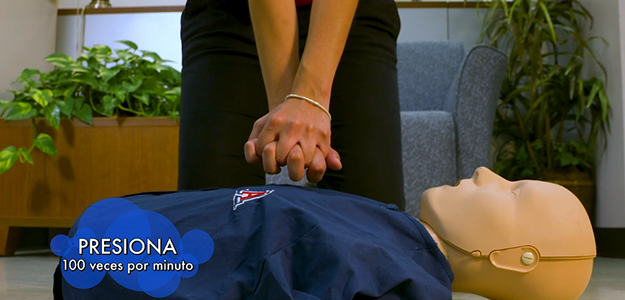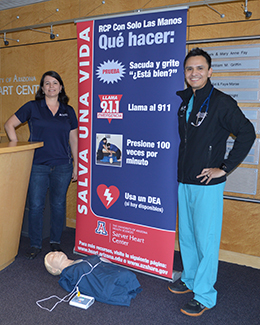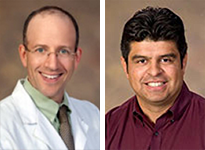 Overwhelming evidence shows bystander chest-compression-only CPR significantly improves survival from a cardiac arrest. Research also reveals large disparities in survival that exist between socioeconomic, racial, and ethnic groups. Hispanics, in particular, remain less likely to receive this form of CPR than non-Hispanics.
Overwhelming evidence shows bystander chest-compression-only CPR significantly improves survival from a cardiac arrest. Research also reveals large disparities in survival that exist between socioeconomic, racial, and ethnic groups. Hispanics, in particular, remain less likely to receive this form of CPR than non-Hispanics.
A group of medical students from the University of Arizona College of Medicine – Tucson, working with the UA Department of Emergency Medicine and UA Sarver Heart Center, began identifying interventions that could increase the use of chest-compression-only CPR among Hispanics in Arizona. These interventions would have a major impact on addressing health disparities in the Hispanic community – a growing minority that now totals approximately 30 percent of the state’s population.
 Thanks to a $5,000 grant from the Arizona Area Health Education Centers (AHEC), the UA student-led Resuscitation Education and CPR Training Group, known as REACT, created Spanish-language videos and materials on how to perform chest-compression-only CPR for the Spanish-speaking community free of charge. The effort was led by fourth-year medical student Marty Cisneroz, MPH (on right in photo at left), a former REACT president and the primary investigator for the grant, and
Thanks to a $5,000 grant from the Arizona Area Health Education Centers (AHEC), the UA student-led Resuscitation Education and CPR Training Group, known as REACT, created Spanish-language videos and materials on how to perform chest-compression-only CPR for the Spanish-speaking community free of charge. The effort was led by fourth-year medical student Marty Cisneroz, MPH (on right in photo at left), a former REACT president and the primary investigator for the grant, and  Daniel Beskind, MD, MPH, associate professor of emergency medicine. Tomas Nuño, PhD, a UA emergency medicine research assistant professor, also provided faculty guidance and mentorship.
Daniel Beskind, MD, MPH, associate professor of emergency medicine. Tomas Nuño, PhD, a UA emergency medicine research assistant professor, also provided faculty guidance and mentorship.
In addition to the Spanish-language training videos, the grant provides resources, such as mannequins and practice automatic external defibrillators (AEDs), to various AHEC and mobile health sites in Tucson and Southern Arizona. The students also will begin to evaluate effectiveness of the videos in teaching Spanish-speaking communities CCO-CPR and AED use.
Free educational sessions on chest-compression-only CPR classes taught entirely in Spanish, with hands-on cfvtraining with mannequins and information on how to operate an AED, are being held at many community events in the greater Tucson area.
Any group of individuals or organizations at the UA and in the community may receive free in-person, hands-on classes on CCO-CPR taught by UA REACT students, provided in Spanish or English. Contact Marty Cisneroz at martinc@email.arizona.edu(link sends e-mail) or REACT at UAmedREACT@gmail.com(link sends e-mail).
Cisneroz explained the benefit of these services: "At its core, this initiative highlights the mission of the UA College of Medicine, which is to support the health and wellness of the community through education, research, and patient care. We are taking the demonstrated benefit of chest compression-only CPR into Southern Arizona and directly attempting to address a large health disparity by providing these educational resources in Spanish."
Watch videos by clicking on images below:
The University of Arizona Division of Cardiology, one of 14 divisions in the UA Department of Medicine—the largest and one of six original departments within the UA College of Medicine, operates largely through the UA Sarver Heart Center. For more information, visit the Center's "Learn CPR" webpage: https://heart.arizona.edu/heart-health/learn-cpr

